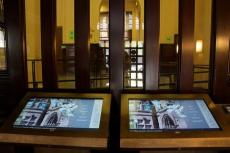June Reading Institute
Monday, June 29 - Friday July 3, 2020
This institute will be offered live, virtually via Zoom.
Hours: 11am-5pm Eastern Standard Time
Payment: Purchase orders for this institute can be made out to: Teachers College Reading and Writing Project Network, 525 W 120th Street, Box 77, New York, NY 10027
Now more than ever, it matters that all our students fall in love with reading and have deep toolkits for accessing language and meaning. In the reading institute, you’ll learn the beautiful intricacies of reading workshop, and for the primary grades, phonics instruction, so that you are well-prepared to create life-long readers, who are flexible, resilient, and joyful. The institute will be taught virtually, and this model will hone your methods for virtual instruction of reading as well as methods for when you in your classroom - preparing you to be a spectacular reading teacher in any environment.
During this five day institute, small and large group sections will give you the opportunity to experience minilessons, partnerships, and clubs. You’ll find out more about engaging read aloud, about knowledge-building, about shared reading, and vocabulary acquisition. You’ll learn more about assessment, and how to harness your assessment data to respond to students’ needs and strengths. No matter the modality in which you teach, you’ll be more prepared to make reading magical and effective for your students.
Advanced (Returning) Sections
MORNING SESSIONS
- Hone Your Methods of Small Group Instruction to Ensure that Students Are Doing the Heavy Lifting of Reading, in School and at Home (K-2), Amanda Hartman
- When You Understand the Challenges and Supports of Text Levels, You Can Better Help Students Negotiate those Levels (K-1), Shanna Schwartz
- Getting Kids Hooked On Author Studies: Teach Young Readers To Do the Interpretation and Cross-Text Work that Avid Readers Do When They Follow an Author (2-8), Heather Burns
- Develop (Paper and Digital) Toolkits to Support High-Leverage Comprehension and Analytic Thinking (3-9), Mary Ehrenworth
- Use Multiple Tools (Bands of Text Complexity, Learning Progressions) to Plan and Power Read Alouds and Small Groups (3-8), Brooke Geller
- Reading-Writing Connections: Reading Workshop, Notebooks, and Literary Essays (3-8), Hannah Kolbo
- Support Students who Receive Special Education Services in Reading Workshop (3-9), Janet Steinberg
AFTERNOON SESSIONS
- Promote Strong Phonological Awareness and Early Phonics, in School and at Home (K-1), Angela Baez
- Develop Toolkits (Paper and Digital) to Support Early Reading (K-2), Lisa Hernandez-Corcoran
- When We Understand Phonics Development, We Can Assess and Teach Better (K-2), Natalie Louis
- Support Foundational Nonfiction Reading Skills in the Upper Grades Reading Workshop (3-6), Alissa Reicherter
- Writing and Talking to Grow Thoughtful Readers: Book Clubs and Grand Conversations (3-9), Katy Wischow
- Making Small Group Work More Active, Intimate, and Full of Feedback (3-9), Lizzie Van Tassel
- Culturally Relevant Teaching: Student Engagement and Motivation in Reading Workshop (4-9), Sonja Cherry-Paul
Where
This institute will be offered in real-time, online via Zoom, and videos will not be recorded for later distribution.
Registration and Payment
The noncredit registration fee for this institute is $850. You will be notified by e-mail if your application is accepted. Your acceptance e-mail will provide a link for payment (credit card or PO only). For more information about the institute, please visit our Frequently Asked Questions.




